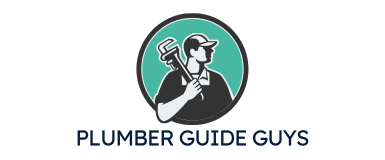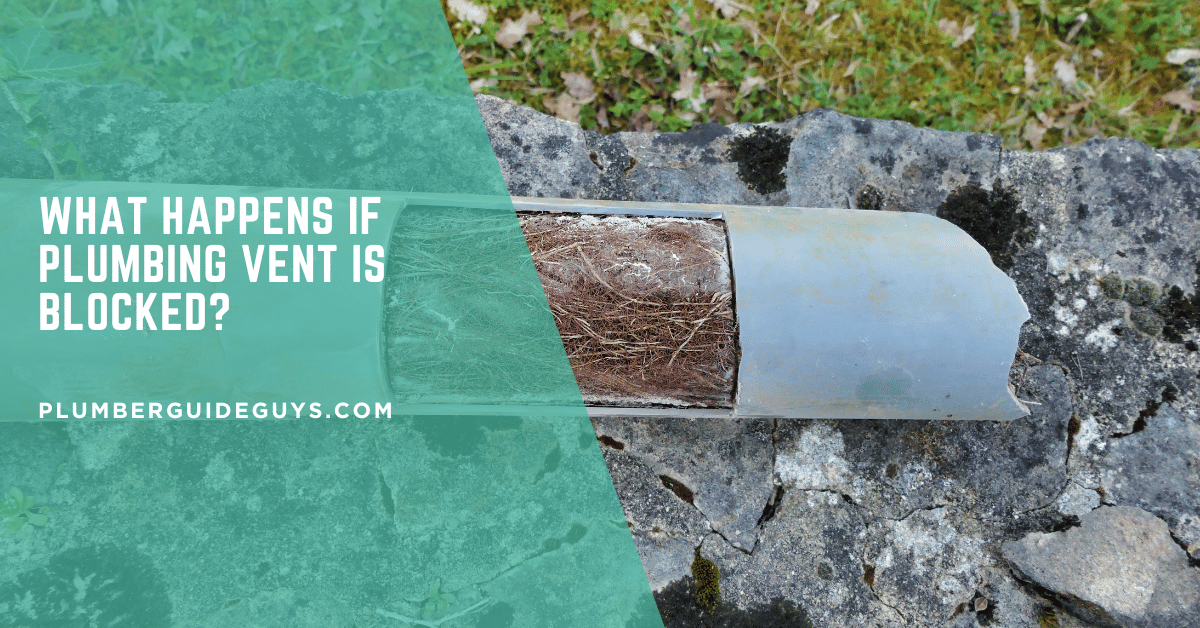Affiliate Disclosure
Plumber Guide Guys is a participant in the Amazon Services LLC Associates Program, an affiliate advertising program designed to provide a means for sites to earn advertising fees by advertising and linking to Amazon.
What Happens If Plumbing Vent Is Blocked? Ever thought about a silent disaster in your home’s plumbing? A blocked plumbing vent can cause more harm than you think. It might lead to expensive water damage and unexpected repairs.
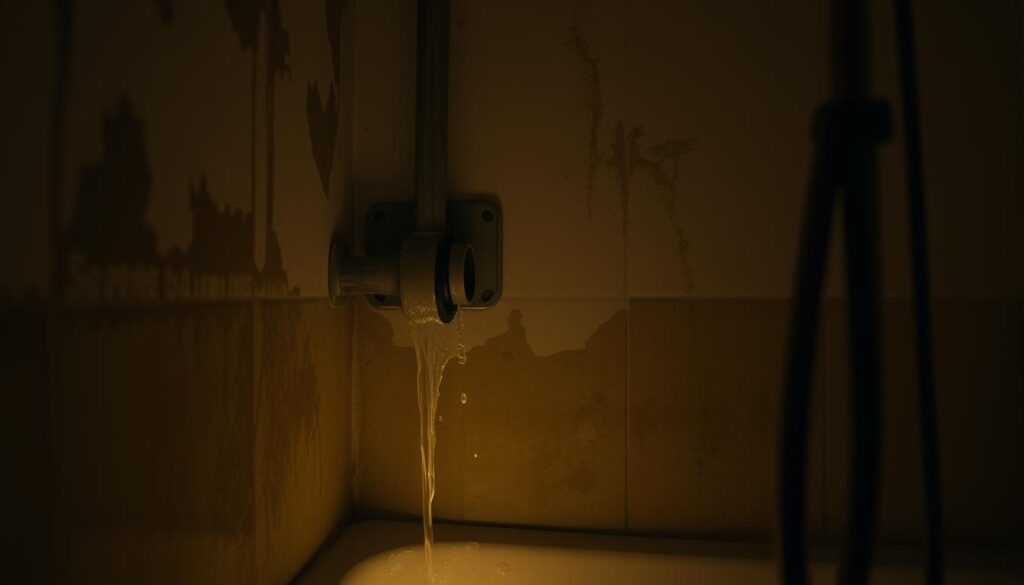
In 2017, water damage claims in the U.S. averaged $10,234. This made them the second-most common insurance claim for homeowners. A blocked plumbing vent can start a chain of problems. These can affect your home’s drainage system.
It’s important to know what happens if a plumbing vent is blocked. These hidden blockages can cause pressure imbalances and disrupt water flow. They can lead to serious plumbing issues that might not be noticed until it’s too late.
Key Takeaways
- Blocked plumbing vents can cause serious drainage problems
- Water damage from plumbing issues can be extremely expensive
- Early detection of blocked plumbing vent symptoms is critical
- Proper ventilation is essential for healthy plumbing systems
- Professional inspection can prevent costly repairs
Table of Contents
Understanding Your Home’s Plumbing Vent System
Your home’s plumbing system has a complex network of pipes and vents. Most homeowners don’t think about it much. The plumbing vent system is key to keeping water flowing well and avoiding problems.
The plumbing vent system manages air pressure in your pipes. It creates a balance that lets water flow well. This balance also stops dangers from vent obstructions.
The Role of Air Pressure in Plumbing
Air pressure is vital for your plumbing’s performance. Without the right ventilation, your pipes can face issues like:
- Slow drainage
- Gurgling sounds
- Water backup
- Potential sewer gas buildup
Components of a Plumbing Vent Stack
A plumbing vent stack has several important parts:
| Component | Function |
|---|---|
| Vent Pipe | Allows air to enter the plumbing system |
| Roof Penetration | Provides exit point for gases and maintains air pressure |
| P-Trap | Creates water seal to block sewer gases |
How Ventilation Affects Water Flow
Good ventilation lets water flow smoothly through your pipes. When air moves freely, it stops vacuum effects. These effects can disrupt water flow and cause plumbing issues.
Knowing how your plumbing vent system works helps you spot problems early. It keeps your plumbing running well.
Common Causes of Plumbing Vent Blockages
Your home’s plumbing vent system can face many blockage challenges. Knowing why roof vent pipes get blocked helps prevent big drainage problems.
Outdoor factors like leaves, twigs, and debris often block roof vent pipes. Wildlife, like small animals, can also cause blockages by building nests or dropping materials into these openings.
- Fallen leaves and tree branches
- Accumulated dust and dirt
- Bird and rodent nests
- Ice and snow buildup
- Moss and organic growth
Inside your home, grease, soap residue, and mineral deposits can also block your plumbing vents. These substances build up over time, narrowing the pipes and reducing airflow.
| Blockage Source | Potential Impact | Difficulty of Removal |
|---|---|---|
| Organic Debris | Partial Airflow Restriction | Low |
| Animal Nests | Complete Blockage | High |
| Mineral Buildup | Gradual Restriction | Medium |
Regular roof checks and upkeep can stop these blockages. Homeowners should think about checking their vent stacks every year to keep their plumbing working well.
What Happens If Plumbing Vent Is Blocked: Main Effects
A blocked plumbing vent can cause big problems for your home’s drainage system. When the vent is blocked, it messes with the air pressure needed for water to flow well. Knowing these effects is key to keeping your plumbing working right and your home healthy.
Immediate Impact on Drainage
When a plumbing vent is blocked, you’ll see changes in how water drains. Water will drain very slowly, causing frustrating bottlenecks in sinks, showers, and toilets. The what happens if plumbing vent is blocked is clear through these drainage problems.
- Sinks and bathtubs take much longer to empty
- Toilets flush with reduced efficiency
- Gurgling sounds emerge from drains
Long-term Consequences for Your Plumbing
Long-term blockages can damage your home’s plumbing. The extra pressure and blocked air can harm pipes, leading to:
- Pipe corrosion
- Potential pipe ruptures
- Increased risk of leaks
Health and Safety Concerns
The biggest worry is sewer gas from blocked vents. These gases can get into your home, posing health risks. Methane and other harmful gases can build up, causing:
- Respiratory irritation
- Headaches
- Potential long-term health complications
Fixing a blocked plumbing vent fast is vital to protect your home and family. A professional can inspect and fix these problems before they get worse.
Signs of Slow Draining and Water Backup Issues
Spotting blocked plumbing vent symptoms early can prevent expensive repairs. A clogged vent pipe causes slow draining, which has clear signs. Homeowners need to recognize these signs fast.
Your home’s drainage system shows key signs of vent blockages:
- Water draining slowly in many fixtures
- Gurgling sounds from sink or shower drains
- Bad sewer smells near plumbing
- Water standing in sinks, showers, or bathtubs
Blocked plumbing vent symptoms appear in specific areas:
- Bathroom Fixtures: Toilets flush weakly or not at all
- Kitchen Sinks: Drainage gets slower
- Shower Drains: Water pools around your feet during showers
These signs mean your plumbing vent might be blocked. Without proper air flow, water can’t move well. This leads to slow drainage and backup problems.
Professional plumbers say to check drainage issues to avoid damage.
Gurgling Sounds and Air Pressure Problems
When your plumbing system has ventilation issues, strange sounds are a big warning. Toilet gurgling blocked vent problems show up as specific noises. Homeowners should not ignore these sounds.
Drain noises are not just background sounds. They can show big problems with your plumbing system’s ventilation. Knowing these sounds can help you find issues early, before they cost a lot to fix.
Identifying Unusual Drain Sounds
Gurgling sounds mean there’s an air pressure problem in your pipes. These sounds happen when:
- Air can’t flow right through the plumbing vent
- Negative pressure builds up in the drainage system
- Water has trouble flowing smoothly
Understanding Air Pressure Dynamics
Plumbing vents keep air pressure balanced, letting water flow well. When these vents get blocked, the whole system gets messed up. Toilet gurgling blocked vent problems cause suction. This pulls air through odd paths, making those bubbling or gurgling sounds.
Professional plumbers say to listen to these sounds. They can spot ventilation problems early. This helps avoid bigger plumbing issues.
Sewer Gas Symptoms and Risks
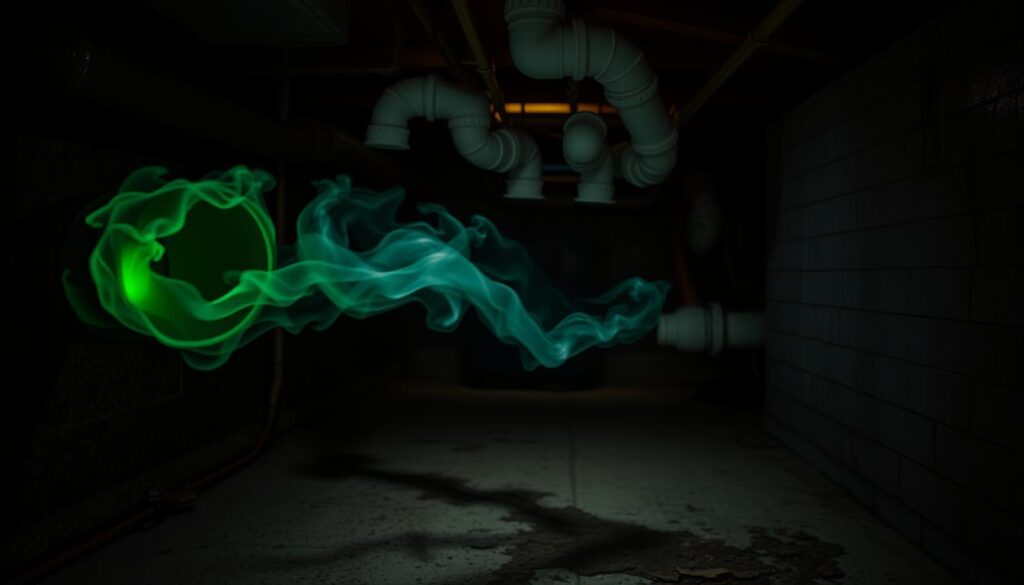
Sewer gas from blocked vents can be a serious health risk in your home. This hidden danger happens when your plumbing vents get blocked. Knowing the signs can help keep you and your family safe.
A strong rotten egg smell is often the first sign of sewer gas problems. This smell means dangerous gases are getting into your home. Methane, a key part of sewer gas, is very harmful.
- Potential health symptoms of sewer gas exposure:
- Headaches
- Nausea
- Dizziness
- Fatigue
Long-term exposure to sewer gas can cause serious health issues. The gases contain harmful substances like hydrogen sulfide and carbon dioxide. These can lead to breathing problems and even poisoning if not treated.
It’s important to catch the signs early. If you smell bad odors or feel sick without reason, your vents might be blocked. Getting a professional to check your vents can stop serious health problems from sewer gas.
Impact on Toilet Function and Performance
A blocked plumbing vent can really mess with your toilet. It disrupts air pressure, making your toilet work poorly. Knowing these problems helps you fix them before they get worse.
Empty Tank Complications
Blocked vents can mess with your toilet’s water levels. Without air, the tank can’t fill right. This is because air pressure is low, making water flow slow.
- Insufficient water fill levels
- Slow tank refilling
- Incomplete water reservoir
Flushing Challenges and Possible Fixes
A blocked vent also messes with flushing. Without air, flushes are weak, leaving waste behind. This can lead to bigger plumbing problems.
- Check for visible vent blockages
- Inspect roof vent pipe for debris
- Use professional plumbing snake if needed
If your toilet keeps gurgling or water levels are off, you need a pro. A licensed plumber can find and fix the problem. They’ll make sure your toilet works its best again.
Effects on P-Traps and Water Seals
Your home’s plumbing system uses P-traps to keep sewer gas out. These curved pipes hold water that acts as a seal. This seal keeps dangerous gases from getting into your home.
But, when ventilation problems happen, P-traps can fail. The water in them can evaporate. This leaves your home open to harmful sewer gases.
- P-traps create a water barrier in drain pipes
- Blocked vents disrupt the delicate water seal mechanism
- Evaporation of water can happen rapidly in blocked systems
Long-term ventilation issues raise the risk. A dry P-trap becomes a direct pipeline for sewer gases. This can be very bad for your health.
“A functioning P-trap is your first line of defense against sewer gases in your home.” – Professional Plumbing Association
It’s important to check your plumbing system’s ventilation often. Look for signs like bad smells, slow drains, or gurgling sounds. These can mean your P-traps are losing their seal.
Professional Diagnosis and Inspection Methods
Finding a blocked roof vent pipe needs special skills and careful checks. Professional plumbers use advanced ways to find and fix plumbing vent problems. These problems can harm your home’s drainage system.
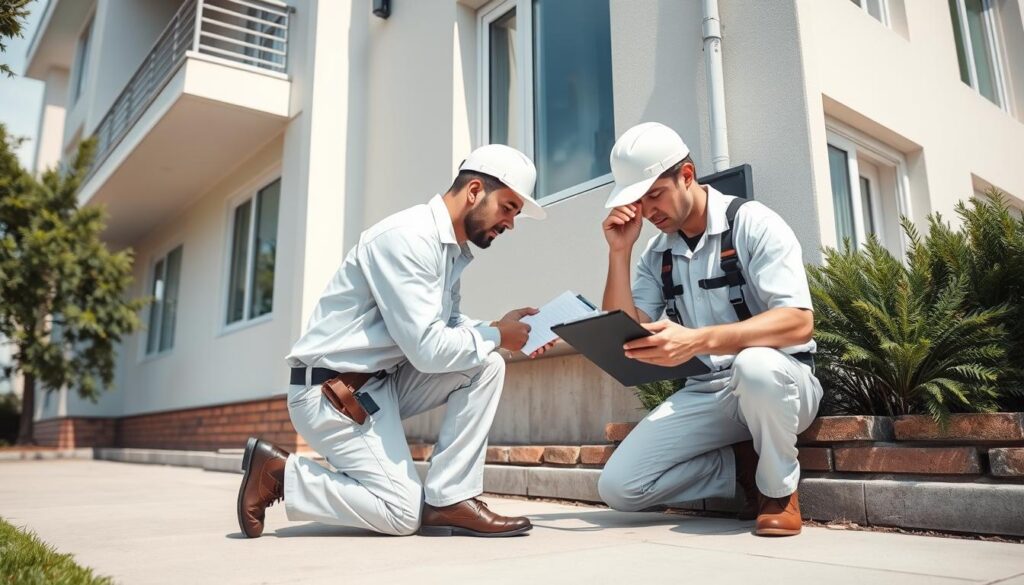
Experts take a detailed approach when fixing plumbing vents. They check several important things:
- Visual roof inspection of the vent pipe
- Specialized camera diagnostics
- Pressure testing of the ventilation system
- Listening for unusual drain sounds
Roof Access Safety Considerations
Checking roofs for blocked vent pipes is very careful work. Plumbers wear special safety gear to avoid accidents. This includes:
- Sturdy roof harnesses
- Non-slip footwear
- Proper ladder techniques
- Weather-appropriate safety gear
Advanced Testing Procedures
Plumbers use advanced tests to find vent blockages. These tests help find where and what the blockage is.
| Diagnostic Method | Purpose | Detection Capability |
|---|---|---|
| Camera Inspection | Visual pipe examination | Precise blockage location |
| Pressure Test | Measure air flow resistance | Identify ventilation restrictions |
| Water Flow Simulation | Check drainage performance | Detect possible obstructions |
“Proper diagnosis is the first step in effective plumbing vent repair.” – Professional Plumbing Association
Knowing about these professional checks helps you see how complex finding and fixing blocked roof vent pipes is.
DIY Troubleshooting Steps and Safety Precautions
When you notice blocked plumbing vent symptoms, it’s important to be careful and aware of safety. Before you start any repair, make sure you understand the situation and know your limits.
First, inspect your roof’s plumbing vent stack visually. Look for signs of blockages:
- Visible debris around the vent opening
- Leaves, branches, or animal nests blocking airflow
- Signs of exterior damage to the vent pipe
When you do DIY plumbing vent repair, remember these safety tips:
- Use proper roof safety equipment
- Wear non-slip shoes
- Have a stable ladder
- Consider using a safety harness
Warning: If you feel uncomfortable or unsafe at any point, stop immediately and contact a professional plumber.
For small blockages outside, you can try to remove debris with a plumber’s snake or water pressure. But be careful not to harm the vent pipe. For blockages inside, it’s best to call a pro because it can be complex and risky.
For basic checks, you’ll need:
- Flashlight
- Plumber’s snake
- Protective gloves
- Garden hose with gentle spray nozzle
Most plumbing vent problems need a pro’s help. Your safety and your home’s plumbing system are very important.
When to Call a Professional Plumber
Dealing with plumbing vent issues can be tricky. Some minor problems might seem manageable. But, certain situations need professional help. Knowing when to call a plumber can save you from costly repairs and health hazards.
Professional plumbers have the tools and knowledge for fixing plumbing vents. They can spot complex issues that you might not see.
Emergency Situations Requiring Immediate Professional Help
- Persistent sewer gas odors inside your home
- Complete drainage system failure
- Water backing up in multiple fixtures
- Visible structural damage around vent pipes
- Repeated gurgling sounds from drains
Cost Considerations for Professional Vent Repair
Understanding the costs can help you decide on plumbing vent repair. Professional services might seem expensive at first. But, they can save you from more costly damage later.
| Service Type | Estimated Cost Range | Complexity |
|---|---|---|
| Basic Vent Inspection | $100 – $250 | Low |
| Vent Pipe Cleaning | $150 – $500 | Medium |
| Full Vent System Replacement | $500 – $1,500 | High |
When choosing a plumber, look for licensed professionals with good reviews. Make sure they have clear pricing. Ask about warranties and get multiple quotes to find the best service for your needs.
Conclusion
Knowing what happens if your plumbing vent is blocked is key to a healthy home. Your plumbing needs clear vents to work right. Ignoring blockages can cause big problems, not just with drainage.
Blocked vents are a real danger to your home’s plumbing. They can lead to sewage backups and health risks from trapped gases. It’s important to check your vents often and fix problems fast.
Homeowners need to watch their plumbing closely. Strange noises, slow drains, or odd water movements might mean vent issues. While some problems can be fixed yourself, others need a pro to keep your plumbing safe.
Knowing what to do and acting fast is your best defense against plumbing problems. Get regular checks, look out for signs, and fix blockages quickly. This way, you can keep your plumbing in good shape and avoid expensive repairs later.
